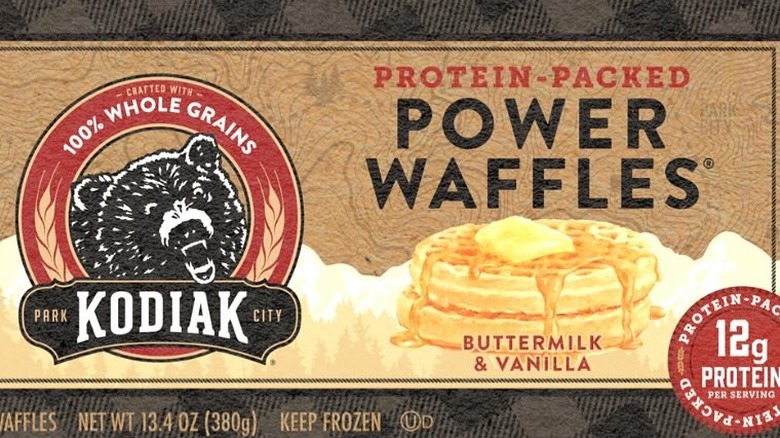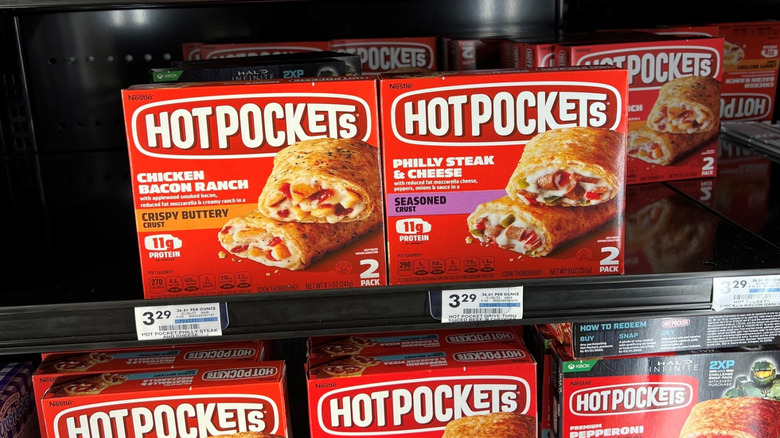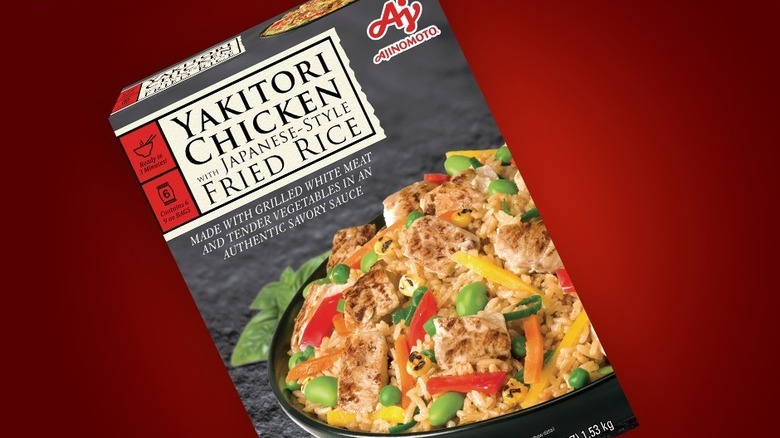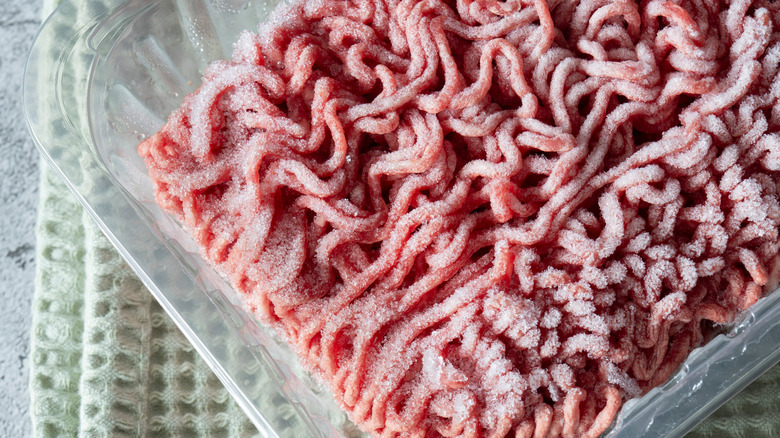The Biggest Frozen Food Recalls In US History
Frozen foods make life easier. If you've had a busy day, it's quick and convenient to open the freezer and pull out some nuggets, waffles, or hamburgers to heat up for dinner or a snack. Frozen foods also make things easier for restaurants and food service companies, too. The food lasts much longer, which reduces costs and food waste. But even though it is often a bit of a lifesaver, frozen food can come with some serious drawbacks.
Over the years, everything from frozen vegetables to frozen nuggets to frozen meatballs have been subject to major recalls. In some cases, it's due to undeclared allergens or foreign objects in the food, but in others, it's because outbreaks of foodborne bacteria have made people very sick. In one particular incident, animal cruelty led to a recall of millions of frozen beef products from all over the U.S. Keep reading to learn about this historic case, and many more major incidents from the last few decades.
More than 40 brands recalled 9 million frozen waffles and pancakes across the US due to potential listeria contamination (2024)
In 2024, TreeHouse Foods recalled over 9 million frozen toaster waffles, Belgian waffles, and pancake products from stores across the U.S. and Canada, including Aldi, Kroger, Albertson's, Target, Publix, and Walmart, due to listeria fears. The bacteria, which, if consumed, can lead to the potentially life-threatening illness listeriosis, was originally found in the TreeHouse Foods products during routine testing. More than 40 brands, including Good & Gather, Giant Eagle, Kodiak Cakes, Wild Harvest, and Simple Truth, were implicated in the recall.
Listeriosis is particularly dangerous for vulnerable people, including the elderly, the very young, and those who are pregnant. In fact, consuming foods with listeria bacteria can even lead to miscarriage or stillbirth in pregnant women. Luckily, given the sheer scale of the recall, there were no reports of listeriosis associated with the bacteria contamination.
More than 325,000 pounds of organic frozen strawberries recalled amid an outbreak of hepatitis A (2023)
Listeriosis isn't the only illness that can be transmitted via food — far from it, in fact. Another potentially life-threatening condition that consumers need to be aware of in the food supply is hepatitis A. This virus, which infects the liver, is spread by feces. It can get into crops, for example, when they are grown in land or water that has been contaminated with sewage. Unfortunately, this might have been the case in 2023, when the Scenic Fruit Company was forced to recall more than 325,000 pounds of frozen organic strawberries from stores, including Aldi, across the U.S. Companies involved in related strawberry recalls included Meijer, Wawona, and California Splendor, which supplied strawberries to Costco.
Unfortunately, in this particular case, illnesses were reported in association with the strawberries. There were 10 confirmed cases of hepatitis A in four states (California, Hawaii, Oregon, and Washington) and four people needed hospital treatment. Hepatitis A is usually cleared by the body on its own, but in some cases, it can cause serious liver problems.
Nestlé Prepared Foods recalled more than 762,600 pounds of frozen hot pockets over fears they could contain glass and hard plastic (2021)
Foodborne illness is one common cause of food recalls, but it's not the only reason products get pulled from the shelves. Foreign objects are another leading cause of recalls, and they can also pose a threat to health. Stray pieces of manufacturing equipment or packaging are a choking hazard, and if they're sharp, they can cause oral or internal injuries, too. That's why in 2021, Nestlé Prepared Foods recalled more than 762,000 pounds of Nestlé Hot Pockets with pepperoni from retailers across the U.S. due to fears they had been contaminated with pieces of glass and hard plastic.
Unfortunately, the issue was brought to light due to customer injuries. Four people complained that they had found the foreign objects inside their Hot Pockets, and one person sustained a minor injury in their mouth.
Conagra Brands recalled more than 2 million pounds of frozen entrees due to undeclared milk (2019)
Food allergies are common in the U.S. In fact, research suggests that around 33 million Americans suffer from some form of a food allergy. Around 170 different foods are known to cause allergies, but of those, nine are particularly common: sesame, egg, peanut, tree nuts, wheat, soy, finned fish, crustacean shellfish, and milk. In 2019, Conagra Brands got into hot water because it did not properly declare milk as an allergen on multiple frozen P.F. Chang's Home Menu products, including P.F. Chang's Home Menu Chicken Fried Rice and P.F. Chang's Home Menu Chicken Pad Thai, putting people across the U.S. at risk of an allergic reaction.
The error was discovered in a routine label check, and resulted in Conagra Brands issuing a recall for more than 2 million pounds of products. Fortunately, there were no allergic reactions reported as a direct result of the labeling mistake.
Wayne Farms recalled more than 438,000 pounds of frozen chicken due to metal contamination (2018)
In 2018, Wayne Farms (now known as Wayne Sanderson Farms) recalled more than 438,000 pounds of frozen chicken after one customer discovered a piece of metal inside one of the products. At the time of the recall, the frozen chicken products, including Fully Cooked Diced Chicken and Fully Cooked Grill Market White Chicken Strips, had already been shipped to distributors and restaurants across the U.S.
Like glass and plastic, metal can find its way into food products during the processing stage. Pieces of machinery or wires can break off and end up in the food without being noticed. Of course, this puts customers at risk of internal cuts, which, if serious, could require surgery.
Fortunately, however, the individual who discovered the piece of metal inside the Wayne Farms frozen chicken was not injured. There were also no further reports of metal-related injuries associated with the recall. In an abundance of caution, anyone who had already bought the chicken was encouraged not to consume it.
Stampede Meat recalled over 484,000 pounds of frozen beef due to salmonella concerns (2018)
In 2018, Stampede Meat (also known as SMI Holdings) recalled more than 484,000 pounds of frozen raw beef top sirloin steak, named USDA Select or Higher Boneless Beef Top Sirloin Steaks, over fears that one of the ingredients it was processed with could be contaminated with salmonella. If consumed, the foodborne bacteria can lead to an illness called salmonellosis, which can cause symptoms like diarrhea and vomiting. It isn't usually serious, but in some cases, it can lead to life-threatening complications like bacteremia (which can progress to sepsis).
Testing revealed that au jus seasoning, which had been used in a marinade for Stampede Beef's raw beef, contained salmonella bacteria — but not before it was sent to restaurants across the U.S. Luckily, nobody reported salmonellosis as a result of consuming the beef. Anyone who may have eaten the beef at a restaurant and then taken home the leftovers was encouraged to dispose of the food.
Gourmet Boutique recalled nearly 300,000 pounds of frozen chicken due to undeclared allergens (2017)
Conagra Brands isn't the only company to be plagued by undeclared milk. In 2017, Gourmet Boutique also had to pull nearly 300,000 pounds of frozen breaded chicken off the shelves because the labeling did not properly declare the allergen. The issue was brought to light by one of the company's ingredient suppliers, who informed Gourmet Boutique that the breadcrumbs used on the chicken contained milk. At the time, the chicken products, including Breaded Chicken Cutlet and Diced Breaded Chicken Cutlet, had already been sent to institutional locations across the U.S.
Luckily, once again, there were no reports of allergic reactions associated with the labeling error. This was fortunate, considering that nearly 2% of children in the U.S. have a milk allergy. For some, the reaction to consuming contaminated chicken would be mild, but for others, it could result in life-threatening anaphylaxis.
Aldi recalled more than 1 million pounds of frozen peas due to listeria concerns (2017)
In 2017, listeria was behind another major recall. Lakeside Foods, Inc., a supplier for the budget supermarket chain Aldi, issued a recall of 1,568 packages of Season's Choice Brand Frozen Peas (the equivalent of more than 1 million pounds) due to fears they could be contaminated with the bacteria. At the time, the frozen peas had been sent to Aldi stores in seven states, including Iowa, Illinois, Ohio, West Virginia, Kentucky, Florida, and Wisconsin.
Listeria is an incredibly hardy strain of bacteria. It can get into vegetables through contaminated soil (usually due to animal manure), and once it's in there, it's difficult to get rid of. This is because listeria can survive refrigeration and freezing temperatures, too. That said, like many pathogens, it will usually be killed off by heat. Fortunately, there were no reports of listeriosis associated with the Aldi recall.
Maxi Canada recalled more than 4.2 million pounds of frozen breaded chicken due to undeclared milk (2017)
Also in 2017, Canadian company Maxi Canada was forced to recall over 4.2 million pounds of frozen breaded chicken products from retailers in the U.S. because, again, they contained milk that had not been declared on the label. As with the Gourmet Boutique recall, the issue was discovered when the company's breading supplier raised the alarm that some of the ingredients could contain milk.
Multiple Maxi Canada products, sold under the Yummy brand, were implicated in the huge recall, including Dino Buddies Chicken Breast Nuggets, All Natural Chicken Fries, and Dino Wheels Chicken Breast Rings. Of concern, was that many of the products were aimed at children. As highlighted earlier, children are more likely to have a milk allergy than adults. Thankfully, there were no reports of allergic reactions, either mild or severe, associated with the undeclared allergen.
CRF Frozen Foods recalled 358 frozen vegetable products under more than 40 brands amid a listeriosis outbreak (2016)
Sometimes, listeria-contaminated products get pulled from the shelves before they can cause any major harm. This was the case with Treehouse Foods and Lakeside Foods, for example. But unfortunately, this doesn't always happen. In 2016, CRF Frozen Foods recalled 358 different frozen vegetable products, sold under more than 40 brands, from stores across the U.S. and Canada following an investigation into a listeriosis outbreak.
Testing found that two products sold under CRF Frozen Foods' True Goodness by Meijer brand (Organic White Sweet Cut Corn and Frozen Organic Petite Green Peas) contained listeria bacteria. Ajinomoto Windsor was one of the companies implicated by the recall. As a result, it had to pull more than 47 million products, including Trader Joe's Chicken Fried Rice and Yakitori Chicken with Japanese-Style Fried Rice, containing the frozen vegetables off of the shelves.
The products led to nine different infections in four different states. Everyone who developed listeriosis as a result of consuming the products had to receive hospital treatment, and unfortunately, three people died. As a result of the outbreak, the CRF Frozen Foods plant responsible for the bacteria, which was located in Pasco, Washington, was temporarily shut down. The plant was not reopened until 2018.
Aspen Foods recalled more than 1.9 million pounds of frozen chicken products due to salmonella fears (2015)
A year before the major listeria outbreak, Aspen Foods was forced to pull nearly 2 million pounds of frozen raw stuffed breaded chicken products from retailers and food service locations nationwide due to salmonella concerns. Several brands, including Kirkwood, Princess, Safeway Kitchens, Market Day, and Chestnut Farms, were implicated in the recall.
Once again, in this case, the recall occurred as a result of an investigation into a cluster of illnesses. Three people in Minnesota reported symptoms after eating the breaded chicken products. The scale of the outbreak may have been bigger, but not everyone reports salmonella infections. This is because symptoms are often mild and clear up on their own. In fact, research suggests that for every reported case of salmonella, there are likely around 30 more that go under the radar.
To avoid salmonella poisoning, foods should always be cooked thoroughly. Chicken products, in particular, pose the biggest risk. Research also suggests that every year, around 1 million get sick from eating poultry products contaminated with bacteria.
City Line Foods Manufacturing recalled more than 1.1 million pounds of frozen pretzel hot dogs due to undeclared allergens (2014)
In 2014, undeclared allergens were the cause of yet another recall. This time, City Line Foods Manufacturing failed to declare on its product labels that one of the ingredients used to process its frozen pretzel hot dogs contained soy lecithin. The hot dogs were sold in a number of products, including Auntie Anne's All Beef Classic Pretzel Dogs, Nathan's Famous Pretzel Dogs, and City Line Foods Pretzel Dogs.
Soy lecithin is a food additive used in a number of products. It's often added as an emulsifier or lubricant, for example, and generally, it's considered safe to consume. However, it does contain soy, which is one of the top allergens in the U.S. For that reason, soy should always be listed as an allergen on any product that contains soy lecithin. At the time of the City Line Foods recall, which involved more than 1.2 million products, the hot dogs had already been sent to retailers across the U.S., but fortunately, there were no reported allergic reactions.
Buona Vita recalled more than 324,000 pounds of frozen meat and chicken due to listeria fears (2012)
In 2012, listeria struck again. Only this time, nobody reported any illnesses. After testing revealed traces of listeria in some of its products, New Jersey company Buona Vita acted fast and pulled more than 324,000 pounds of frozen meat and poultry products from retailers across the U.S. Some of the affected products were: Mama Isabella Beef and Pork Meatballs, Buona Vita Filomena Baked Italian Style Meatballs, DiRusso's Fully Cooked Mini Meatballs, and Silver Lake Brand Cooked Dinner Loaf with Chicken and Beef.
Anyone who had already consumed the products and was concerned about developing listeriosis was encouraged to contact their healthcare provider. Usually, symptoms of listeria will come on around 24 hours after eating contaminated food, especially if the infection is in the intestine, but it can take up to two weeks in some cases.
143 million pounds of raw and frozen beef products recalled due to animal abuse (2008)
In 2008, Westland/Hallmark Meat Company was forced to issue one of the biggest recalls in history. Around 143 million pounds of raw and frozen beef products were pulled from retailers (and schools) not because of foodborne bacteria, foreign objects, or undeclared allergens, but because of severe animal abuse. An investigation by the Humane Society of the United States found that workers at one of the California company's plants were kicking cows that were clearly sick. Some of them couldn't even walk, and had to be transported via forklift.
Cows that are this ill should not be processed for food. This is due to the risk of harmful diseases they might be carrying — like mad cow disease (scientific name bovine spongiform encephalopathy), for example — making their way into the food system. This is why meat plants and slaughterhouses should always be inspected by federal authorities for safety reasons. Unsurprisingly, the Westland/Hallmark Meat Company was shut down after the investigation and subsequent mammoth recall.
More than 21 million pounds of frozen beef products recalled due to E. coli contamination (2007)
Just one year before the historic Westland/Hallmark Meat scandal, Topps Meat Company was involved in a separate major recall incident. This time, more than 21 million pounds of frozen beef products — including frozen hamburger patties — were pulled from stores and institutions nationwide due to fears they contained another strain of dangerous bacteria: E. coli. Consuming any foods contaminated with E. coli bacteria can lead to symptoms like stomach pain and bloody diarrhea. In very serious and rare cases, it can lead to kidney failure.
The contaminated products from Topps Meat Company sickened around 40 people from eight different states. Just like with Westland/Hallmark Meat, Topps Meat ultimately went out of business as a result of the enormous recall, which placed significant financial strain on the company. At the time, it had been one of the biggest suppliers of frozen hamburgers in the United States.















